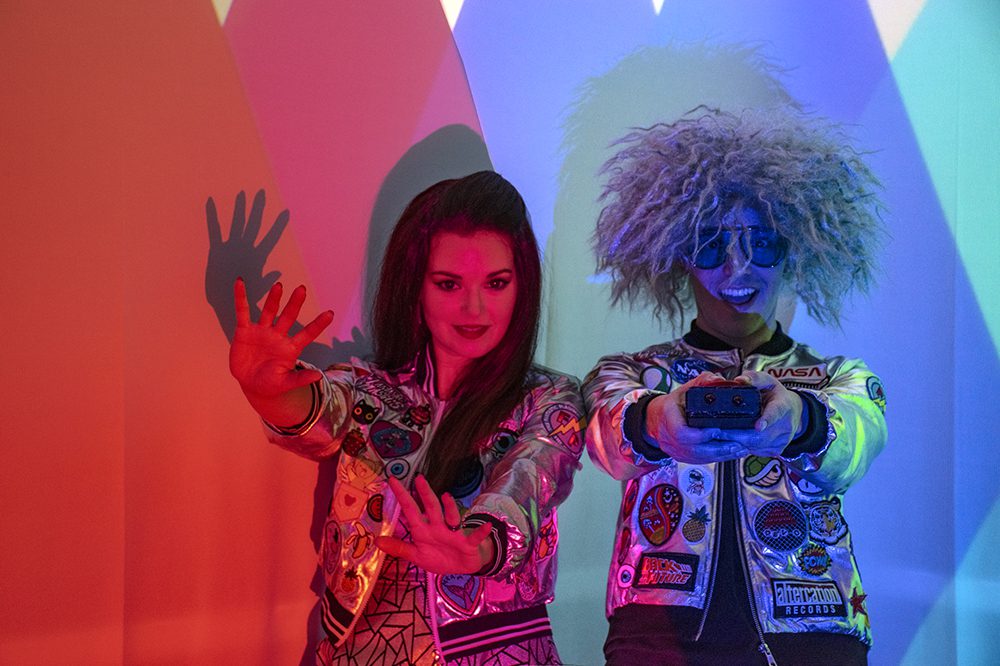
You always notice growth in a plant or pet when you haven’t seen it for a while. The little evolutions we undergo are lost to the everyday eye, but reveal themselves as blazing metamorphoses to the intermittent onlooker. The latter is also true in the case of Jerry Paper, at least according to my eyes and ears. Jerry Paper is a music-making entity, who’s earthly birth name is Lucas Nathan. Like most of life’s best offerings, JP drifted into my frame of awareness with bizarre ease, at first entirely by accident.
Two summers ago I was just dipping my toes into the loungey sound-pool of Sean Nicholas Savage, who was headlining a gig at the late and great Death By Audio. Manning the slot just before Savage was an unlikely looking fellow with big, wire frame glasses and a purple lei ’round his neck, a storage unit’s worth of effects pedals and cables tangled at his feet. It’s hard to say if he looked at the crowd once, but I do remember his fanatical immersion in each song.
After a fair share of “live” gigs whereupon the stage is taken over by a man on a date with his laptop, you can become a bit underwhelmed by this sight. And yet Nathan’s music negates the stereotype married to such a setup. I didn’t realize at that point in time that Jerry Paper was more than a stage name reminiscent of 80s power pop. I wasn’t privy to the mythology of Jerry Paper-that Lucas Nathan was merely a host-body which Jerry possesses in order to generate tunes. Nor did I know that Nathan was originally a student of philosophy; though a brief leafing through his lyrics could have informed me so, as he discusses the likes of simulacra, fuzzy logic, and “the settings of the synthesized mind.”
That first set knocked me out completely. Despite the sterile stage layout Nathan was writhing with groove, seemingly possessed whenever a song commenced, and back to normal upon its completion. I remember thinking at the time that he reminded me of Elvis Costello, but it wasn’t just his glasses; something in the depth of his voice and the quiet arrogance of his stage presence. It was perhaps the impression that his performance was a 40-minute revenge act from a man who’s much smarter than everyone in the room. I rushed to the merch table immediately after and bought a copy of his 2014 LP Big Pop For Chameleon World, which I’ve been listening to ever since.
One of the things that make Jerry Paper so special is his potential capacity for cynicism and his subsequent denial of it. Though wearing the guise of empathetic AI and employing tools of the Muzak genre such as keyboard saxophone and elevator synths, he manages to make sincere, and more importantly good music that is relatable to humans and algorithms alike. Nathan is the first to admit in interviews that yes, he does find synth sax hilarious, but he also truly enjoys the sound of it, or else it wouldn’t get anywhere near the record to begin with.
Seeing Jerry Paper perform at Secret Project Robot this last weekend, it was evident that a lot of things have turned in his favor in only a couple of years. No longer an obscure opening act with only his machines for sonic scaffolding, he was playing a headlining gig backed by a full band. The lineup touted local “non-country” outsider Dougie Poole and the aforementioned bizarro crooner Sean Nicholas Savage, the latter of whom predominantly sang cover songs with a backing track (unfortunately). Dougie Poole was also accompanied by a backing track, but interspersed the noise with guitar phrases and pedal manipulation. Poole’s dopey pigtails only made the melancholy of his ass-dragging cowboy act all the more blue. He is seemingly in character, but it’s a heart-rending effect nonetheless. It was an evening of undeniably odd birds, but what a wonderful thing to see when so many modern bands are required to be ultra slick and fronted by supermodels. Poole resurfaced as a funkified bassist in Jerry Paper’s backing band, which indulged in great versatility via keyboards, guitar, pedal effects, and flute. But it was Nathan who truly rose to his headlining post for the evening. Sporting a fine and shiny spandex body suit he looked like a deep-sea diver-or a black seal maybe, as he was bobbing around the stage with similar grace and silliness.
It seems as though Nathan has undergone a fair amount of change since I first saw him at Death By Audio in 2014. Two full length albums (2014’s Big Pop For Chameleon World and 2015’s Carousel) and 3,000 miles (he recently relocated to his home state of California), the evening was a celebration of his latest record Toon Time Raw!. And it was the first celebration: the record release party, the first gig of the tour, and I believe the first time Nathan has ever been backed by a full band; this last little fact seeming odd as Jerry Paper was evidently born to front a band.
JP is a wildly charismatic entertainer, his interpretive dance gestures conveying equal sincerity and hilarity. His on-stage banter is wonderfully deadpan, an air that is contradicted by his nervous and polite off-stage presence. “It’s great to be alive,” he droned into his headset microphone. “But having a body is sooo annoying.” Jerry’s jab at his own host body earned a hearty laugh from the room. “But you are a body, so…fuck it,” he concluded.
Nathan’s lyrics and performances seem rife with these sorts of blasé aphorisms that wink at his education, but don’t force it down your throat. Conceptually the music of Jerry Paper could be coined as abstract or out-there, but the inherent groove is what makes it approachable. Much like Daft Punk are robots with beating, blood-pumping hearts, Jerry Paper is code with soul. This combination of the perceived coldness of technology with the foolproof warmth of human music is part of what makes Jerry Paper so compelling; he describes the phenomenon best in an interview with The Editorial Magazine:
“What the fuck is more human than a computer? That doesn’t happen outside of humans. Electronics are purely human tools. I think a lot about the separation of humans and nature and why we think like that instead of thinking of humans as part of nature. I hate to sound like a douchebag but it’s very Cartesian/mind-body dualism. We think of electronics as not natural, but if humans are natural then our tools are also natural.”
Agree or disagree, it is an irrefutably relevant perspective, especially considering that so much of our budding technology is used for social purposes, including the making and sharing of music.
Toon Time Raw!, as with last Saturday’s performance are markers in the upward motion that Jerry Paper is riding high. The LP, out on Bayonet Records, picks up where Carousel left off, but lets things get even warmer, even groovier, proving that Nathan is a legitimate pop songwriter with beauties such as “Ginger and Ruth,” “Zoom Out” and “Stargazers.”
It’s a rare thing to locate genre-less music. They majority of hype bands seem to fit into some sort of self-referential box labeled with a bygone genre. Just check “dream pop” or “psych rock” or “surf-girl-group-garage” and you’ll get someone’s attention. But Jerry Paper, be he your cup of tea or not, won’t be squeezing into a box any time soon. And for that, I tip my hat to him.





